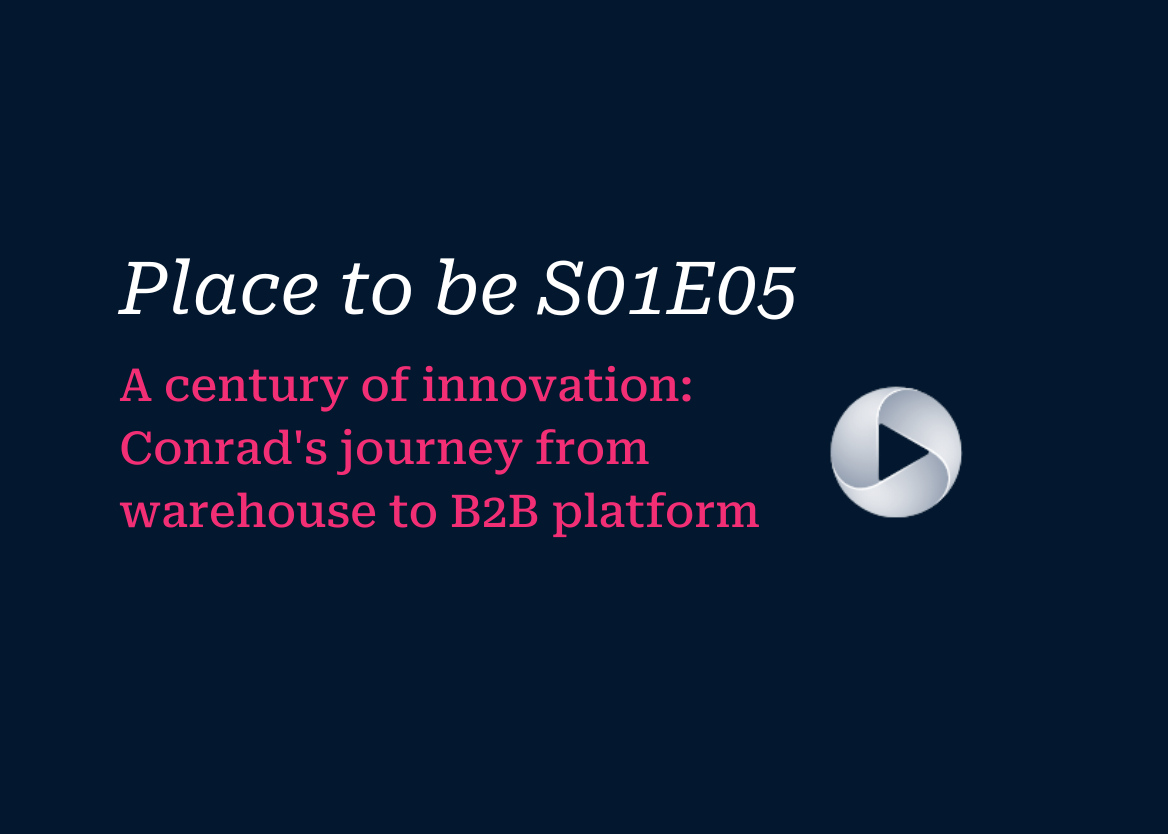From legacy to leadership: Conrad’s journey to B2B marketplace success

After 100 years in business, most companies lean on what’s worked. Conrad Electronic chose to build what’s next.
Founded in 1923 as a small radio repair shop in Germany, Conrad has evolved into a leading technology distributor and, more recently, a digital-first B2B platform.
Their transformation reflects more than staying power. It’s a case study in strategic reinvention, customer-centric innovation and the bold decisions required to lead in the platform economy.
This blog unpacks Conrad’s journey from traditional wholesaler to B2B marketplace, the strategies fueling their growth and key takeaways for companies navigating their own digital transformation.
For a deeper dive into the story, listen to the full episode of Place to be, where Conrad CEO Ralf Bühler shares firsthand insight into the company’s evolution and what’s next.
From radio repairs to multi-billion euro revenues
Over decades of experimentation and evolution, Conrad expanded beyond radio repairs to become a household name in Germany for supplying electronics and technology products.
By the 1970s and 1980s, Conrad had embraced catalog sales, an early sign of their willingness to innovate around how customers buy.
That spirit of innovation came into full focus in 1999, when Conrad launched their first online store. This move laid the foundation for their future as a digital-first business.
Today, the company generates over a billion euros in annual revenue and employs more than 2,500 people.
But more than scale, what sets Conrad apart is their mindset: a willingness to rethink legacy operations, embrace new models and use technology to stay ahead of changing customer expectations.
The shift to a B2B platform
As market dynamics evolved, Conrad recognized the need to move beyond traditional distribution. The rise of digital marketplaces fundamentally changed how businesses procure products and services. To remain competitive and future-focused, Conrad made a strategic shift toward the B2B sector and repositioned as a comprehensive platform partner for business customers.
Why the shift?
Bühler pointed out that the decision to become a B2B platform stemmed from two things:
Customer demand: Conrad’s B2B customers wanted efficiency. They needed a simplified, cost-effective procurement process for indirect spend items – often referred to as C-parts. The ability to consolidate vendors and reduce transaction complexity resonated with businesses looking to save time and money.
Scalability limitations: Expanding their warehouse operations and inventory to meet demand wasn’t scalable or cost-efficient. Instead, building a digital platform and introducing a curated marketplace model provided a smart alternative.
By launching a B2B platform, Conrad was able to offer companies an unparalleled range of products while maintaining its expertise in technology and electronics. This wasn’t just a gradual change; it was a bold leap into a different business model.
As Bühler explained, "For us, it was all in or all out, and we went all in."
Core drivers behind Conrad’s B2B growth
Conrad’s transformation didn’t happen overnight, nor was it without challenges. These pillars formed the foundation of Conrad’s success:
1. Unified shopping experience
Conrad’s approach to B2B involves blending their stocked inventory with an expansive marketplace. With over 10 million products listed and 1,000 carefully curated third-party sellers, businesses rely on Conrad as a one-stop shop for their procurement needs.
Whether items come from Conrad’s warehouse or a marketplace seller, the promise to customers remains the same: reliable service, competitive prices and wide product availability.
2. Quality control
Many platforms struggle to balance rapid expansion with maintaining high-quality standards. Conrad’s marketplace is curated to ensure both product quality and reliable service levels.
Their team of business developers actively scouts for the right partners while a partner success team supports sellers to meet high service expectations.
This proactive approach ensures a seamless customer experience, whether products are bought from Conrad directly or via third-party sellers.
3. Innovation and adaptability
Conrad has a history of pioneering changes in how it does business. From creating one of the first online stores in the late 1990s to creating a seamless integration between their own operations and marketplace, Conrad has embraced innovation to maintain its competitive edge.
4. Customers insights
By continuously analyzing customer needs and market trends, Conrad positions itself to deliver not just products but solutions to customers’ procurement complexities.
Their focus remains on solving business pain points rather than simply selling products, which has greatly resonated with their audience.
What’s next for Conrad?
While Conrad has achieved remarkable success, Bühler admits there’s still work to be done. Two key areas remain top of mind:
Cross-border transactions: Ensuring seamless international transactions and compliance with varying regulations remains a challenge unique to B2B marketplaces.
Service parity: Bridging the gap between first-party and third-party services is critical. Customers should see no difference in quality, regardless of where the product originates.
For a company celebrating its centennial, the ambition and drive to innovate like a startup remain one of Conrad’s strongest differentiators. It’s a powerful example of how embracing change is essential to lasting success in a constantly evolving market.
Tune into the full Place to be podcast episode with Ralf Bühler for deeper insights into Conrad’s remarkable journey and strategic evolution.


